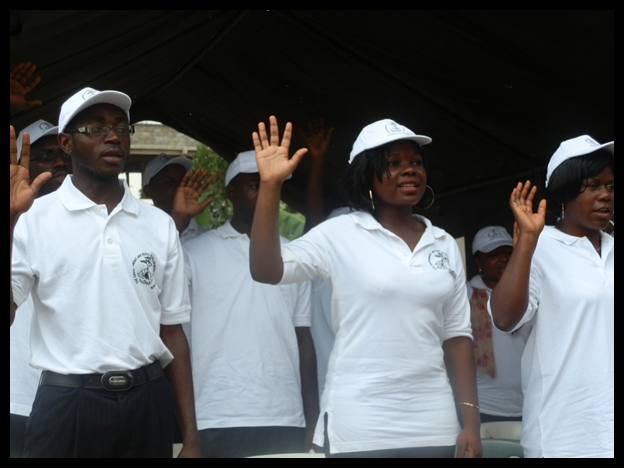
The Institute of Biodiversity and Non-profit Studies, IBiNS has sworn in its first batch of trainees in a formal ceremony that took place at the Institute’s Campus in Buea on the 30th January, 2013. Delivering the academic discourse, the Chair of scientific committee of the Institute, Dr. Chuyong George lauded the
students for making the brilliant choice of doing research on the environment and called on them to be ambassadors of the biodiversity. Dr. Chuyong explained that the biodiversity provides goods and services for the most fundamental of human needs ranging from food, medicine, with 80% of the world’s population still using plants as medicine based on ancestral knowledge and close to 30% of all pharmaceuticals developed from plants and animals. He called on the matriculating students to therefore champion the conservation struggle by living a more sustainable life and influencing others around them to conserve the biodiversity.
The Institute of Biodiversity and Non-profit studies, IBiNS it would be recalled is the capacity and scientific building division of the Environment and Rural Development Foundation, ERuDeF. The Institute has as goal to train the next generation of conservation leaders as well as serve as a center for excellence for Biodiversity Research and Non-profit studies in Cameroon, the Central African Region and Africa.
Officially opening the occasion, the Board chair of ERuDeF, Eric Akemnda could hardly hide his excitement on the realization of a dream “ I am full of excitement as we all gather here today to celebrate the first matriculation of IBiNS” Mr. Akemnda was quick to remind the audience that it was exactly one year since the Institute was launched and he was proud to say the Institute is not just out to train environmental researchers, but employers and the next generation of Chief Executive Officers given that the courses are tailored to make the trainees self-employed, not job seekers. He urged the students to work hard and keep the flag of the Institute flying. Mr. Akemnda went on to say the training was one of its kind given that upon completion of studies, 95% of the graduates would be absorbed by the mother organization, ERuDeF. “At IBiNS, we intend to set the pace in conservation science development in Cameroon. Some of the specialized programmes offered amongst others include Certificate Diploma, Postgraduate and Master Programmes in Mountain Studies, Water Resource Management, Environmental Journalism, Fundraising, NGO studies, Applied social Research and Forestry and Climate Change” Mr. Akemnda added.
On his part, the pioneer Director of the Institute, Dr. Okolle Justin stressed that the Institute will go a long way in supporting the development of environmental reporting which has hitherto been neglected in the country. He explained that the trainees would learn the courses in a non-conventional way, with 70% of practical, 15% instructions and 15% self study. Dr. Okolle insisted that at the end of the academic year, a student must show prow of having mastered the techniques for fundraising, writing a project proposal and publishing research results in peer-reviewed journals.
Co-chairing the event, the South West Delegate for Vocational training, Foretia James lauded the initiative of the school, describing it as the first in Anglophone Cameroon “ I have known of vocational training centers, but I have hardly known of one like IBiNS which trains young people in conservation science. This Institute will help policy making given that with their expertise, our ministry will be able to draft new examination schemes and syllabuses that would be used in case other Institutes of this nature crop up”. On behalf of his Ministry, the Delegate pledged total collaboration wherever need arises.
One of the trainees, Ndimuh Betrand expressed himself “I chose Environmental Journalism because I have realized that there is a gap in Cameroon’s media landscape as far as environmental reporting is concerned. Research in this field will permit me disseminate information to Cameroonians on some of the best ways in protecting our rich environment”.
By Sigalla Emmanuel



